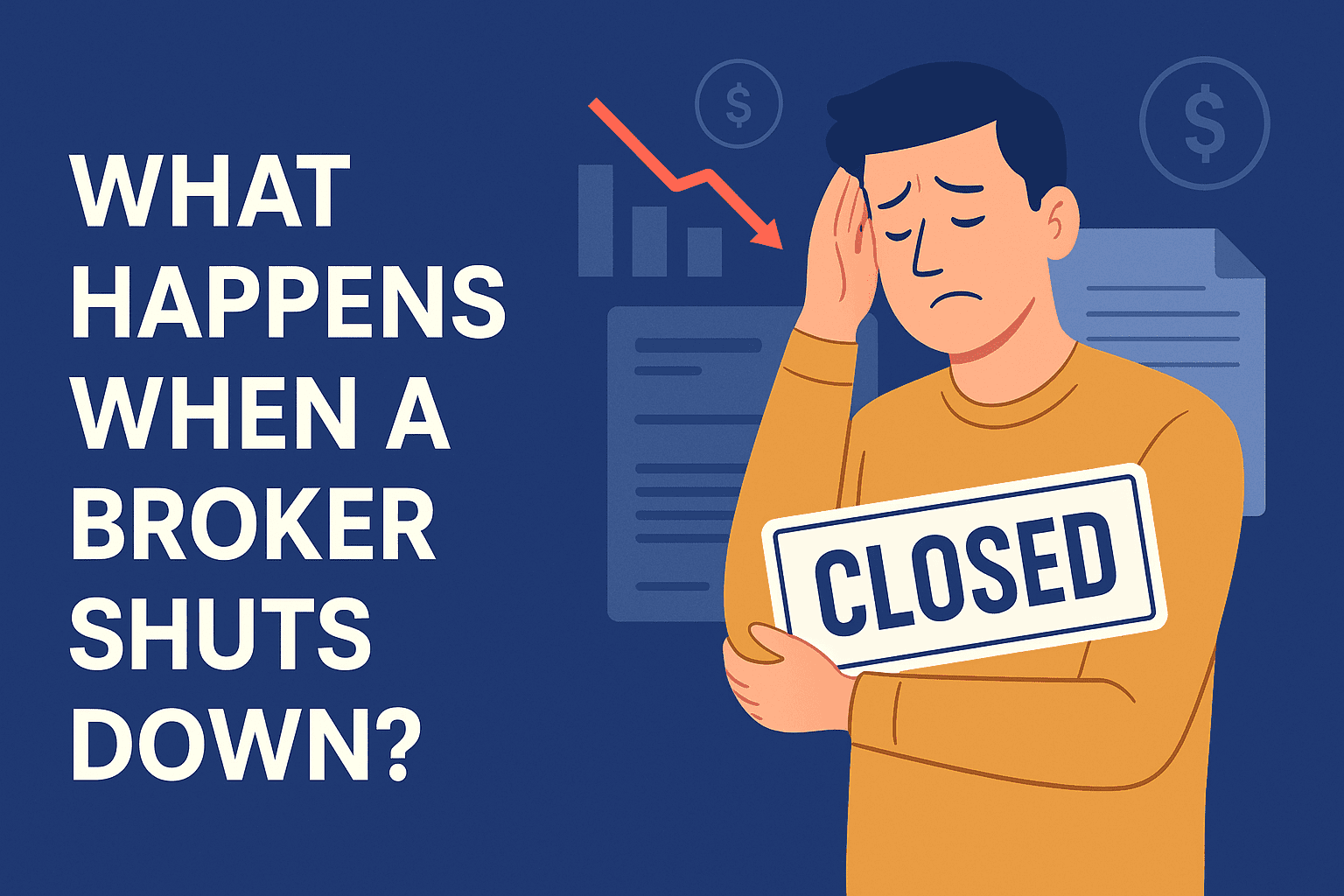Imagine if one morning you come to know that your stockbroker has shut down, then the first thought that comes to mind is: What will happen to money and shares? Will all of them be lost? Something similar happened in the Karvy Stock Broking case in 2019, where shares of thousands of investors were wrongly pledged. In such a situation, fear is bound to arise in the minds of every investor. Is our money really safe?
In this blog, we will know what happens when a stockbroker shuts down, how safe is your money and shares and what you should do.
Why Stockbrokers Might Shut Down?
Stockbrokers in India are fully regulated by SEBI (Securities and Exchange Board of India). Despite this, the past years have seen many brokerage firms shut down, usually due to the following reasons:
- Regulatory violations (SEBI Rules Violation) : If a broker violates the rules set by SEBI such as client fund segregation, reporting or audit rules, etc. then it can be banned or restricted.
- Financial insolvency : Sometimes brokers misuse clients’ funds or securities to cover their own losses. When the dues mount and they fail to settle, the exchanges and SEBI take action.
- Fraud/Misappropriation : For example, in 2019, Karvy Stock Broking pledged the shares of clients without their permission, leading to a scam worth crores.
Key examples (as per SEBI Action) :
| Brokerage Firm | Reason for closure | SEBI / Exchange Action | Year |
|---|---|---|---|
| Karvy Stock Broking | Misuse of client securities | Banned by NSE & BSE, SEBI action | 2019 |
| BMA Wealth Creators | Non-compliance with the regulatory provisions | Suspended | 2020 |
| Anugrah Stock Broking | Shortfall of client funds and securities, improper records, etc. | Suspended | 2020 |
In these cases, it has been observed that brokers misuse the shares or cash present in the accounts of investors for their own benefit. When SEBI comes to know of such irregularities, it takes immediate action and tries to protect the investors.
So always trade with a registered and trusted broker and keep an eye on your account.
What Happens When a Broker Shuts Down?

When a stockbroker suddenly shuts down or faces legal proceedings by SEBI and the exchange, the entire process is as per the rules and in a phased manner. It does impact investors, but there are various investor protection rules in place. The process is mentioned below:
- Trading gets suspended : First of all, NSE or BSE shuts down the trading facilities of that broker so that no further transactions can take place.
- SEBI and the exchange freeze the operations : All transactions, fund transfers and back-office work are stopped. The purpose of this is to prevent any more misappropriation.
- Client funds may be temporarily blocked : Your money with the broker may be stuck for some time until the situation becomes clear.
- Demat holdings are safe : If your shares are held in demat form with CDSL or NSDL, they are held in your name and are not impacted by the closure of the broker (we will discuss this in detail in the next section).
Read Also: How to Become a Sub Broker in India
Are Your Shares & Mutual Funds Safe?
When a stockbroker suddenly shuts down, the first question that comes to mind is “What will happen to my shares and funds?”
The truth is that if you have regularly cross-verified your transactions with the email received from the depository stating transactions in your demat account, then your shares are safe with CDSL or NSDL and there is no need to panic. These shares are registered with the depository in your name, not the broker’s. The broker just facilitates transactions and doesn’t keep custody of your shares meaning, even if any prominent broker shuts down, your shares are still safe.
Mutual funds are also safe : The record of mutual funds units held by you is available to both the AMC i.e. Asset Management Company and their RTA like CAMS or KFintech. The broker just offers you the facility of buying and selling assets. So even if the broker shuts down, there is no effect on your mutual funds units.
How to track?
- CDSL’s ‘Easi’ and ‘eDIS’ portals give you complete information about your shares, which shares you have, how many you have, and transaction history.
- NSDL’s IDeAS platform also gives you the same data if you have a demat account under NSDL.
Keeping yourself updated about your Demat account holdings is the easiest way to track and keep your investments safe. SEBI has created a system that puts investor safety at the forefront. Even if the broker fails, your investments will not be affected.
Investor Protection Fund (IPF): Your Safety Net
If, for some reason, your stockbroker closes down and you have some funds in the trading account or your shareholdings are stuck, then you have another option – Investor Protection Fund (IPF).
This fund has been created by NSE and BSE to protect investors. If an investor suffers financial loss due to the broker and the broker is unable to compensate for that loss, then IPF compensates your loss to some extent.
How much can I claim?
| Exchange | IPF Limit / Investor / Broker | Claim Time Limit |
|---|---|---|
| NSE | Up to ₹35 lakh | Within 3 years from the date of occurrence of default |
| BSE | Up to ₹15 lakh | Within 3 years from the date of occurrence of default |
How to claim IPF?
- File a complaint : On SEBI’s SCORES portal or directly on the NSE/BSE website.
- Investigation process begins : The exchange or SEBI checks whether the defaulting broker has caused a loss and other details.
- Claim processing : If found correct, you are awarded compensation under IPF up to ₹35 lakh in NSE and ₹15 lakh in BSE.
- Documentation is important : Documents like contract notes, demat account statements and proof of loss must be with you.
- Time limit to keep in mind : Claim deadline is within 3 years of the default event.
Why is it important for you
- NSE’s IPF is backed by a massive corpus of ₹2,534 crore as of May 2025, which shows its commitment to protect investors.
- This fund is exclusively for retail investors, so even if the broker commits fraud, you do not have to suffer huge losses.
- The audit and utilization of IPF is done in a transparent manner as per SEBI and exchange regulations.
Read Also: How to Close Your Demat Account Online?
Tips to Stay Protected as an Investor
As an investor, it is important to keep the following points in mind:
- Always choose SEBI registered brokers : Before opening an account with any broker, check if it is SEBI-registered or not.
- Prefer well-known or regulated brokers : Reputed brokers like Pocketful , Zerodha, Angel One, etc. are trustworthy.
- Do not leave large amounts of money in the trading account : Keeping a large amount of funds idle in your trading account increases risk. If not needed, transfer funds back to your bank account.
- Check Demat account holdings regularly : Check shareholdings and transaction reports from your depository login once a month.
- TPIN based transactions: The transactions are authorized by TPIN (like CDSL TPIN), which further increases security, so that no one can transfer your shares without your permission.
Conclusion
If your stockbroker suddenly shuts down, there is no need to panic but rather act sensibly. In India, institutions like SEBI, NSE and BSE have come up with stringent regulations and provisions like Investor Protection Fund to protect investors. Your shares and other assets are safe with the depository (CDSL/NSDL) and there is no need to panic. It is just important that you take the right steps at the right time and be cautious about your investments.
Frequently Asked Questions (FAQS)
What happens to my shares if my broker shuts down?
Your investments remain safe even if the broker shuts down as your shares are held by depositories such as CDSL or NSDL
Can I transfer my shares to another broker?
Yes, you can easily transfer shares to a demat account opened with a new broker.
What is an Investor Protection Fund (IPF)?
This is a protection fund which compensates for the losses incurred by investors due to the defaulting of the broker.
How much compensation can I get from IPF?
Compensation up to ₹35 lakh can be received in NSE and up to ₹15 lakh in BSE.
Where can I file a complaint against the broker?
You can lodge an official complaint online on SEBI’s SCORES portal.

